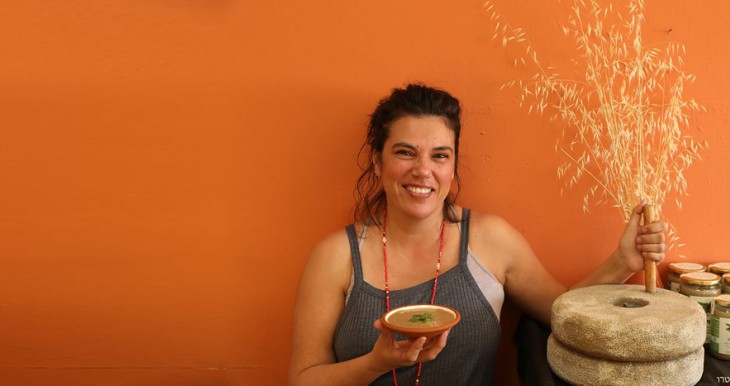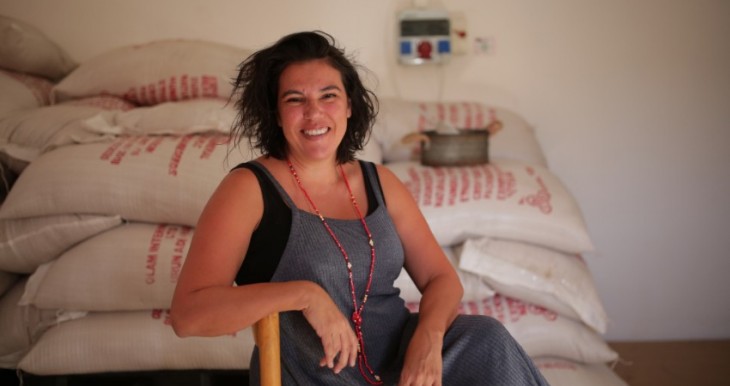You’d normally consider tehina a simple everyday product, not a source of innovation or a gift idea for Hanukkah. But leading up to the Festival of Lights (December 2-10 this year), Michal’s tehina plant—named, quite simply, “Tehina”—is sending out direct shipments of her creative flavors of the condiment, such as grapefruit with spinach and honey as well as purple onion and thyme.
The way Michal describes it, her production of health-conscious tehina feels like a miracle, much like the miracles of Hanukkah.
“Over the years, I have developed a method for grinding whole sesame seeds,” Michal explains. “Pre-sprouting, I wash the seeds only with water, without salt or other substances. This helps me peel the seeds, and the resulting product is ground sesame with no separation between the shell and the nucleus. That is how tehina’s nutritional values are preserved.”
Michal launched her business with seed funding (pun intended) from The Jewish Agency’s Loan Funds: Support for Israeli Entrepreneurs, which are grassroots economic development engines for entrepreneurs and small business owners in Jerusalem, the Negev, and the Galilee.
Michal’s venture was supported by the UJA-Federation of New York’s Loan Fund for Israel. The Loan Funds support small businesses in Israel and also support Israeli entrepreneurs from target populations such as new immigrants, the Arab population, the Haredi (ultra-Orthodox) population, and the Ethiopian community. Loan Funds provide technical assistance and guarantees to applicants to help them qualify for bank loans, which are granted at special terms, and enjoy exceptional pay-back rates. From the time they were founded in 2002, through the year 2017, the Loan Funds have assisted 1,790 businesses and led to the creation of about 9,000 jobs. In 2017, The Jewish Agency approved 207 businesses for assistance, who received loans totaling nearly $12.1 million.
“The relief came in stages,” Michal recalls. “At the beginning of my entrepreneurial journey, when I thought about the idea of creating a tehina business, The Jewish Agency believed in me. Then, I realized I was not previously aware of many important aspects of the industry, so I presented them with a new plan to set up a factory, and they stayed with me, during all the incarnations my initiative went through.”
The loan enabled the training of Michal’s staff, her investment in a structure belonging to a kibbutz, and her ability to meet the requirements of Israel’s Ministry of Health.
“It was much more than purchasing the machines to create my product,” Michal says. “The help was both financial and emotional. They always want to know what’s going on with my business so that they can provide encouragement and boost my morale.
When Michal needed to upgrade her machinery, the UJA-Federation of New York’s Loan Fund for Israel provided a second round of financial assistance.
“Without their aid, I would not have existed,” says Michal.
When people think about Israel’s start-up nation culture of high-tech innovation and entrepreneurship, the food industry isn’t usually the first thing that comes to mind. Yet the kind of tehina Michal has developed is truly a mission-driven “superfood” which she views as capable of stemming the global tide of declining nutrition. She explains that she dries sesame seeds at the low temperature of 40 degrees in order to maintain their nutritional value.
“We are still at the beginning of the road,” Michal says. “It has been two years since the product was released. Along the way, we worked with a food technologist who helped us with materials conservation. Today, it is clear that the potential of our product is very high, because we have a health food with a special taste.”
“The usual tendency for food entrepreneurs is to respond to trends in the global food sector,” she continues. “What we’re doing is not a trend, but something deeper. We’re preserving the qualities and uniqueness of an iconic food.”
The primary target audience for Michal’s product is anyone who is health-conscious, including athletes, pregnant women, vegans, and people who try to eat fewer processed foods. But she also caters to those who appreciate finer, higher-quality foods in general.
“My journey of creating tehina has included numerous difficult challenges, like the construction of milling machines,” she reflects. “To this day, I still make tehina directly with my employees. It’s delicious, and healthy. We still have more related products that we’re excited to introduce in the future.”
Learn more about Jewish Agency Loan Funds >
-
This story was originally reported by Nathan Roi for The Jewish Agency for Israel




 0
0


